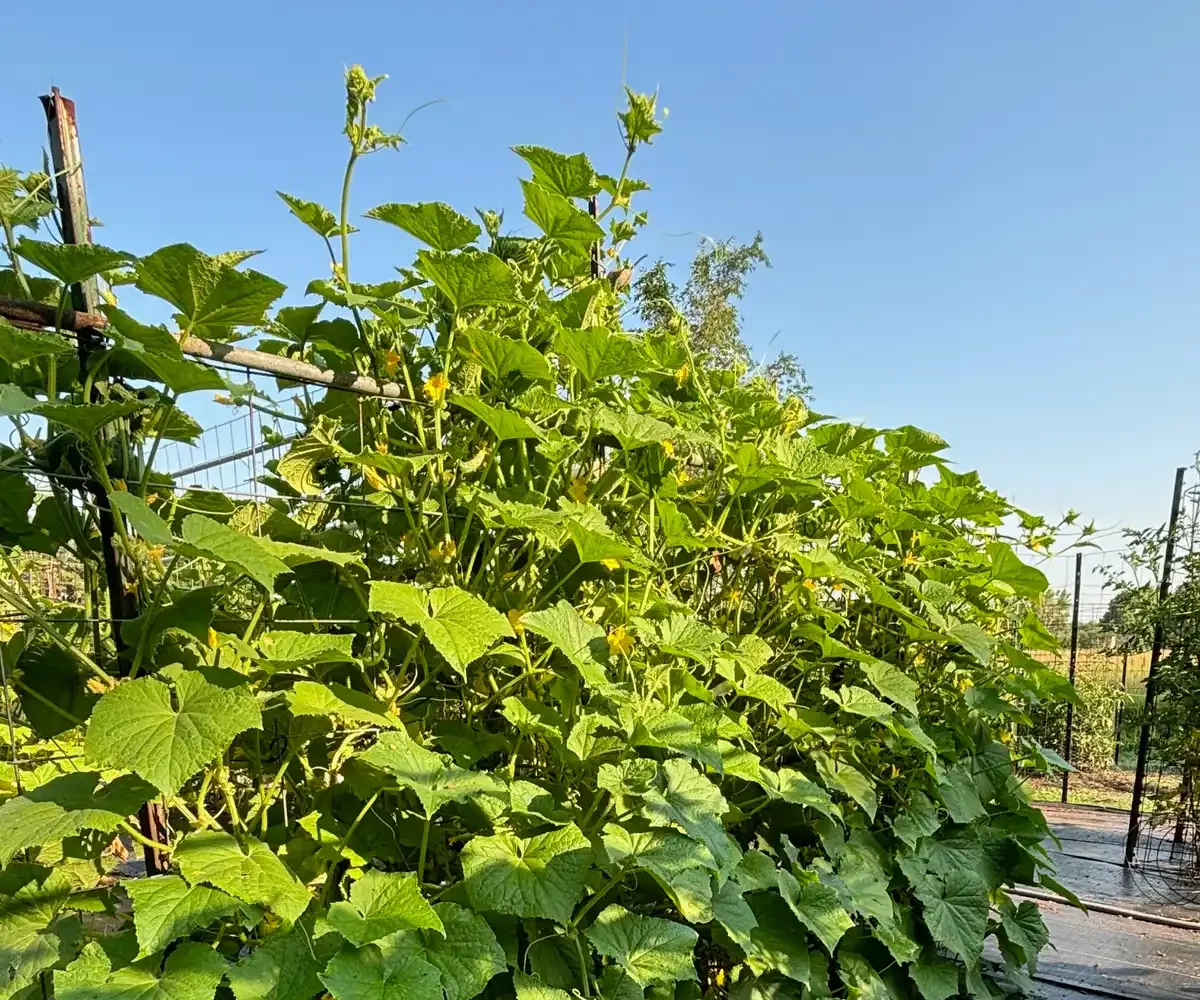The rains of early summer produced abundant growth in the cucumber vines in the community garden. They clung to a wire mesh supporting their vertical ascent. The leaves were a deep green with an abundance of yellow blossoms demonstrating their potential. I watched as the honeybees visited the blossoms seeking precious nectar even as they unknowingly fulfilled their pollination function – truly a reflection of God’s amazing design. Upon closer examination, I discovered one puzzling matter – the absence of fruit which the gardener so anxiously anticipated. I peered under the leaves in search of evidence for this desired outcome but much to my surprise I was only able to find one small cucumber. By this time in the growing season, there should have been an abundant offering. I stepped back again observing the thriving display of foliage and blossoms which deceptively hid the failure to fulfill its ultimate purpose. Some would argue that the vine just needed more time to produce an abundant crop. The truth of this “give it more time” observation was only one aspect of the lesson to be learned on that day.
Walking down the garden path, I became aware that a brief encounter with a cucumber vine was rapidly becoming a parable of spiritual examination.
The provision
The divine Husbandman had planted the gift of faith in my inner man, provided rich soil of spiritual instruction under the tutelage of the Holy Spirit, and filled my heart with the light of the gospel that I might germinate and grow in this new life in Christ. All these provisions reinforced a complete dependence upon God who called for the exercise of spiritual gifts that I might bear the fruit of good works – a worthy walk pleasing Him in all respects, increasing in knowledge all completely empowered by His strength (Col. 1:10). But such an understanding caused the examination to become quite convicting. I saw in the abundant foliage and plentiful blossoms an outward conformity to the expectations of what it was to be a Christian.
But where was the desired fruit?
A reflection on my spiritual investments revealed the dedication of significant time mining the scriptures in pursuit of a deeper understanding of God. I enjoyed joining with others in meaningful spiritual discussion – iron sharpening iron. Reading the great inspirational authors of the faith opened my eyes to spiritual insights which brought great pleasure. But any attempt to find comfort in those spiritual inclinations was quickly dismissed by the reality that the Pharisees also demonstrated such outward conformity.

Ps 51:16-17
“For You do not delight in sacrifice, otherwise I would give it; You are not pleased with burnt offering. The sacrifices of God are a broken spirit; A broken and a contrite heart, O God, You will not despise.”
Awareness
With a heavy heart, I stared at my altar of sacrifice which produced an offensive odor before God. An honest assessment revealed I was basking in the spiritual motion, focusing on the potential for service to God as if that was the end rather than the means. I was enamored with my Christian appearance wondering if others were noticing my spiritual prowess. The intended exercise of faith in action, bearing fruit for God’s glory had been infiltrated by a wretchedness of self-worship – an idol of my own making. The enemy’s deception encouraged complacency in outward potential as if I had achieved the desired outcome when in fact, I had produced an intellectual accomplishment which was of little value to God. “Depart from me you workers of iniquity” would be the final verdict (Matthew 7:23).
I felt a haunting alignment with Judas; a heart driven by an agenda of self-promotion to the exclusion of God’s glory.
This parable of examination revealed an antithetical drift from what I conceived was my heart’s desire. Jesus called true disciples to follow Him, deny themselves, and take up their cross daily – to walk with the same service and sacrifice that He modeled in His obedience to the Father. Truly desiring to be one of Jesus’ disciples required an “All In” commitment driven by a transformed heart inspired by the ineffable sacrifice of Christ who came that I might have life. Merely consuming spiritual sustenance and developing all kinds of potential while failing the translation to God honoring spiritual results was the epitome of Solomon’s vanities. The Apostle James would be in full agreement (James 1:22). I didn’t need more time – I needed obedience driven by a pleasing inclination of the heart.
The Fig Tree
Jesus was returning to Jerusalem from Bethany – having most likely spent the night with Lazarus, Martha and Mary – when in hunger He visited a fig tree. Matthew’s account captures it this way:
Now in the morning, when He was returning to the city, He became hungry. Seeing a lone fig tree by the road, He came to it and found nothing on it except leaves only; and He *said to it, “No longer shall there ever be any fruit from you.” And at once the fig tree withered.
Matthew 21:18-19
The relevance to this parable of examination required some understanding of the fig tree. In the holy land, the usual time for fruit harvest started in June. The parallel account from Mark’s gospel makes it clear that “it was not the season for figs.” (Mk 11;13). I always found that fact to be confusing.
If it wasn’t the season for figs, wasn’t Jesus’ expectation unreasonable.
Further investigation revealed that the fruit bearing cycle of the fig tree was to first produced figs followed by the production of leaves. Although it was early for fig production, the presence of leaves indicated there should have been fruit present as well. But upon inspection, Jesus found none and commanded the tree’s destruction.
The fig tree symbolically stood for the nation of Israel. They demonstrated an outward conformity to the ways of God, but their hearts lacked a legitimate faith in the God they proclaimed to follow. Despite an abundance of religious form, there was no evidence of an inward transformation that necessarily would have led to authentic fruit bearing for God’s purposes. Their faith should have been in season given all that God had done in the long history of the nation of Israel – God’s chosen people. But the spiritual maturity, the representation to all the nations of the earth of God’s sovereign reign was missing.
“Has the Lord as much delight in burnt offerings and sacrifices as in obeying the voice of the Lord? Behold, to obey is better than sacrifice, and to heed than the fat of rams.
1 Sam. 15:22
Satan’s greatest deception was to convince the children of Israel that they were being productive for God when in fact their works were hollow and set for judgment. Contentment with outward conformity enabled a errant conclusion concerning the true nature of the heart. The Messiah had come at just the right season, but the children of Israel, despite all the leaves of outward religiosity, were just days away from complete rejection of Christ. They didn’t need more time; they needed an awakening of the soul, a conviction of their rebellion, and a repentant heart before a holy God. Provisions for faithful living had been provided and the expected fruit offered to God should have been plentiful, but the Messiah found nothing, and judgment was upon them.
Godly Sorrow
Given that fig trees don’t grow in Nebraska, God used a cucumber vine instead. But there was no mistaking the conviction from this parable of examination. I found company in Bunyan’s famous allegory “The Pilgrims Progress”, where Pilgrim in his pursuit of the Celestial City gave occasion to depart from the narrow path having been lured by what seemed like a better way. Peering into my own journey, the revelation of this subtle drift into contentment with outward conformity revealed false conclusions about the purity of my walk with God. How does such a passion for pleasing God morph into a preoccupation with selfish ways? Shouldn’t such departure from God’s desires be obvious? Reviewing the concluding years of Solomon’s life, the wisest man of all was duped into worshiping false gods at his wives’ behest – the manifestation of violating God’s commands against uniting with wives of foreign lineage. Had he become so dull in his spiritual senses that there was no conviction and a lack of godly sorrow? In this parable application, I faced a blindness to my own spiritual tendencies. My heart grieved.
For the sorrow that is according to the will of God produces a repentance without regret, leading to salvation, but the sorrow of the world produces death.
2 Corinthians 7:10
Grappling with this truth concerning my walk with God, I thought about what was going through Peter’s mind as he reflected on the declaration of unswerving allegiance just a short time before the triadic confrontation and denial. Admittedly, Peter was living those events in real time. What was my excuse? I had the full biblical account, 2000 years of hindsight at my disposal, great teaching of the truths of God, and yet I struggled to be pure in my walk with God – to be “All In” for Christ. Peter wept bitterly over his betrayal. But his colleague in the ministry, Judas Iscariot, had a different sorrow – a sorrow of worldly failures which led to death. Contemplating Paul’s words to the Corinthians, I wondered about the nature of my sorrow. I had wondered from the narrow path, deceived in the pursuit of an easier way. It seemed I was enamored with impressing God by displaying my spiritual acumen, my theological understanding, and thus finding contentment in intellectual pursuits. There was no hiding from God – the One who understands every motive (1 Ch 28:9). No longer could I hide behind false piety or seek justification for my failure. I longed to be right before God who with unexplainable mercy had opened my eyes to the wayward path of offensive sacrifice and called for a return to the pursuit of righteous obedience – an offering acceptable to God.
Bearing Fruit
With an authentic love for my Father and a desire to be a true disciple of Jesus Christ, I came before Him with a contrite heart, confessing my waywardness, and acknowledging my selfish desires. I sensed God’s comfort, the provision of His mercy and grace at the expression of my Godly sorrow . He knew the intentions of my heart were genuine. It was then I sensed He was guiding me back to the narrow path that I might continuing the journey toward the celestial city. There was work to be done as His ambassador, to be a light in the darkness, and to be about the many good works which He has prepared for me (Eph. 2:10).
It is a great deal better to fulfill the purpose of God in your life by discerning His will than to perform great acts of self-sacrifice. “To obey is better than sacrifice”.
Oswald Chambers – My Upmost for His Highest (June 8th)
Reflecting on this moment, I realize that God’s instruction often occurs at the least expected moments in our lives. He provides a spiritual lesson that we might grow closer in our walk with Him, refining a sinful tendency – removed as dross – such that we might be more pure in our reflection of His glory. The season is now for bearing fruit for God, standing firm for His honor, and delivering the message of salvation to a world in desperate need of the truth. We must make the most of every opportunity to bear fruit, empowered by the Holy Spirit, that our good works might be pleasing to God. And so it was, a parable of self-examination from a walk in the garden on a sunny day in July.


Leave a Reply